MGMT 103 - Climate Change: Impacts and Future of NZ Agriculture
VerifiedAdded on 2023/03/23
|6
|1241
|76
Report
AI Summary
This report defines and analyzes the impact of climate change on New Zealand's agricultural practices, highlighting the challenges faced by farmers due to droughts, changing climatic conditions, and reduced rainfall. It discusses the implications of these changes, including the increased frequency of floods, droughts, and storms, and identifies six crucial areas at considerable risk. The report also comments on possible future developments, limitations, constraints, problems, solutions, and outcomes, emphasizing the need for strategies to deal with climate variability, plant breeding programs, and integrated land management approaches. It concludes by stressing the importance of government policies to reduce greenhouse gas emissions and promote stable and positive outcomes for New Zealand's agricultural sector. Desklib provides a platform for students to access similar solved assignments and past papers.
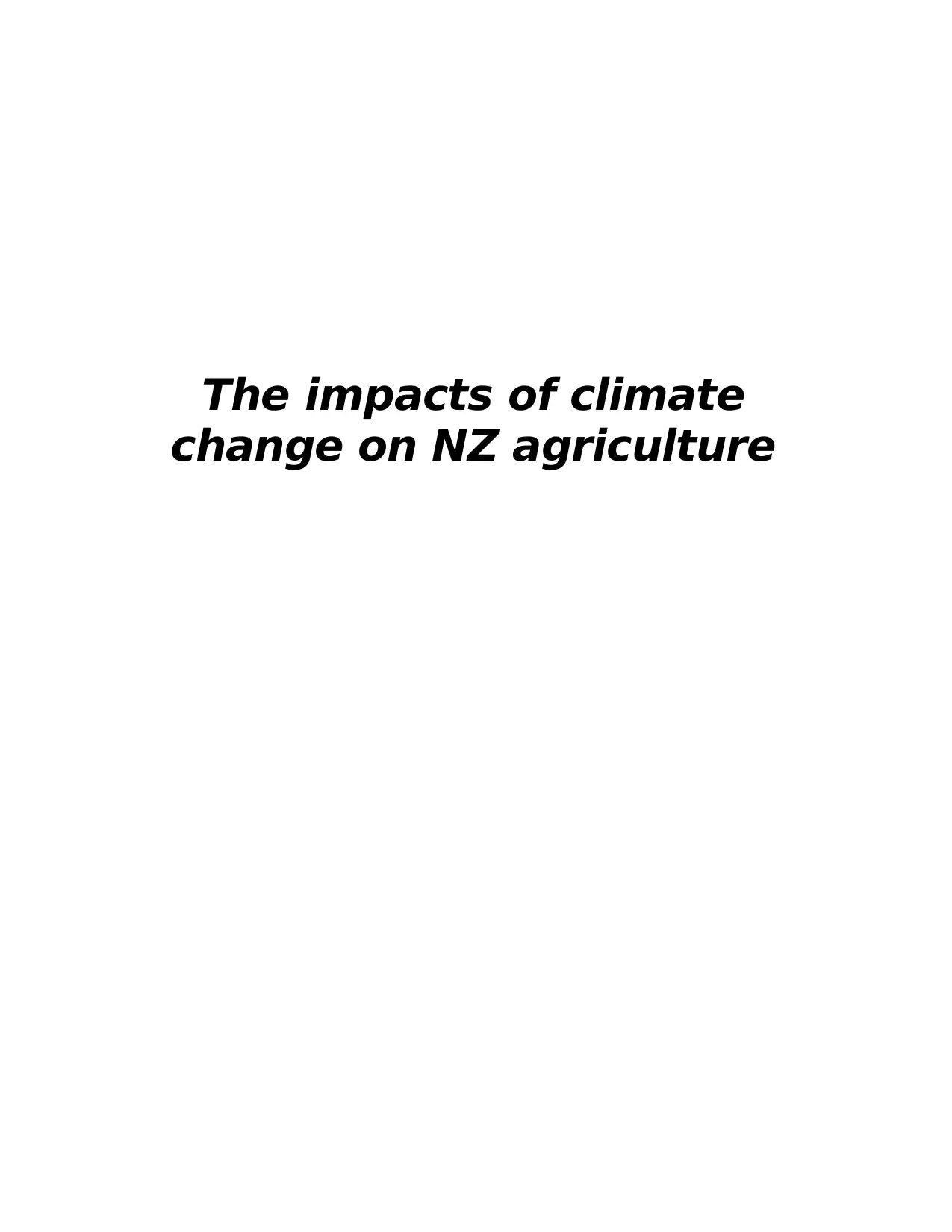
The impacts of climate
change on NZ agriculture
change on NZ agriculture
Paraphrase This Document
Need a fresh take? Get an instant paraphrase of this document with our AI Paraphraser
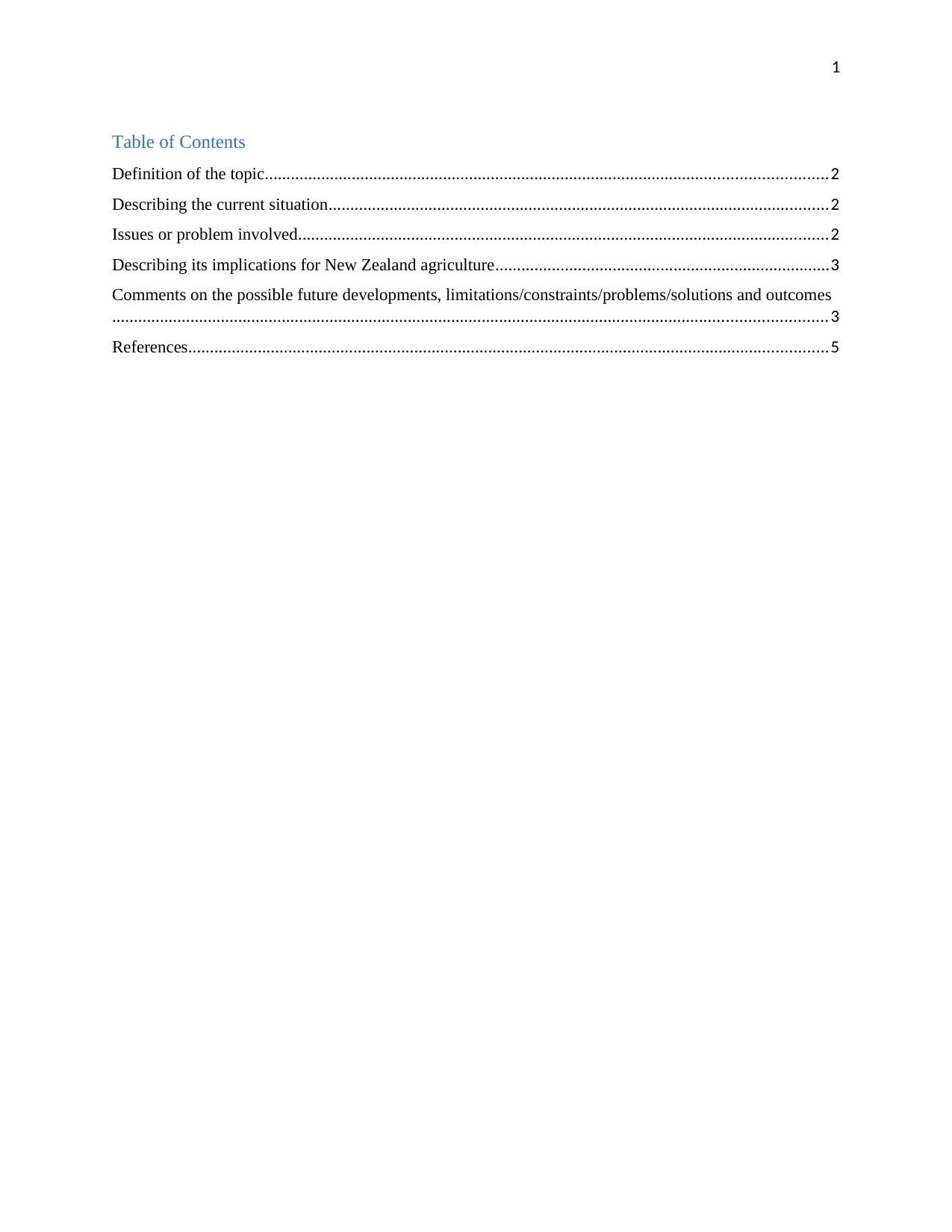
1
Table of Contents
Definition of the topic.................................................................................................................................2
Describing the current situation...................................................................................................................2
Issues or problem involved..........................................................................................................................2
Describing its implications for New Zealand agriculture.............................................................................3
Comments on the possible future developments, limitations/constraints/problems/solutions and outcomes
.................................................................................................................................................................... 3
References...................................................................................................................................................5
Table of Contents
Definition of the topic.................................................................................................................................2
Describing the current situation...................................................................................................................2
Issues or problem involved..........................................................................................................................2
Describing its implications for New Zealand agriculture.............................................................................3
Comments on the possible future developments, limitations/constraints/problems/solutions and outcomes
.................................................................................................................................................................... 3
References...................................................................................................................................................5
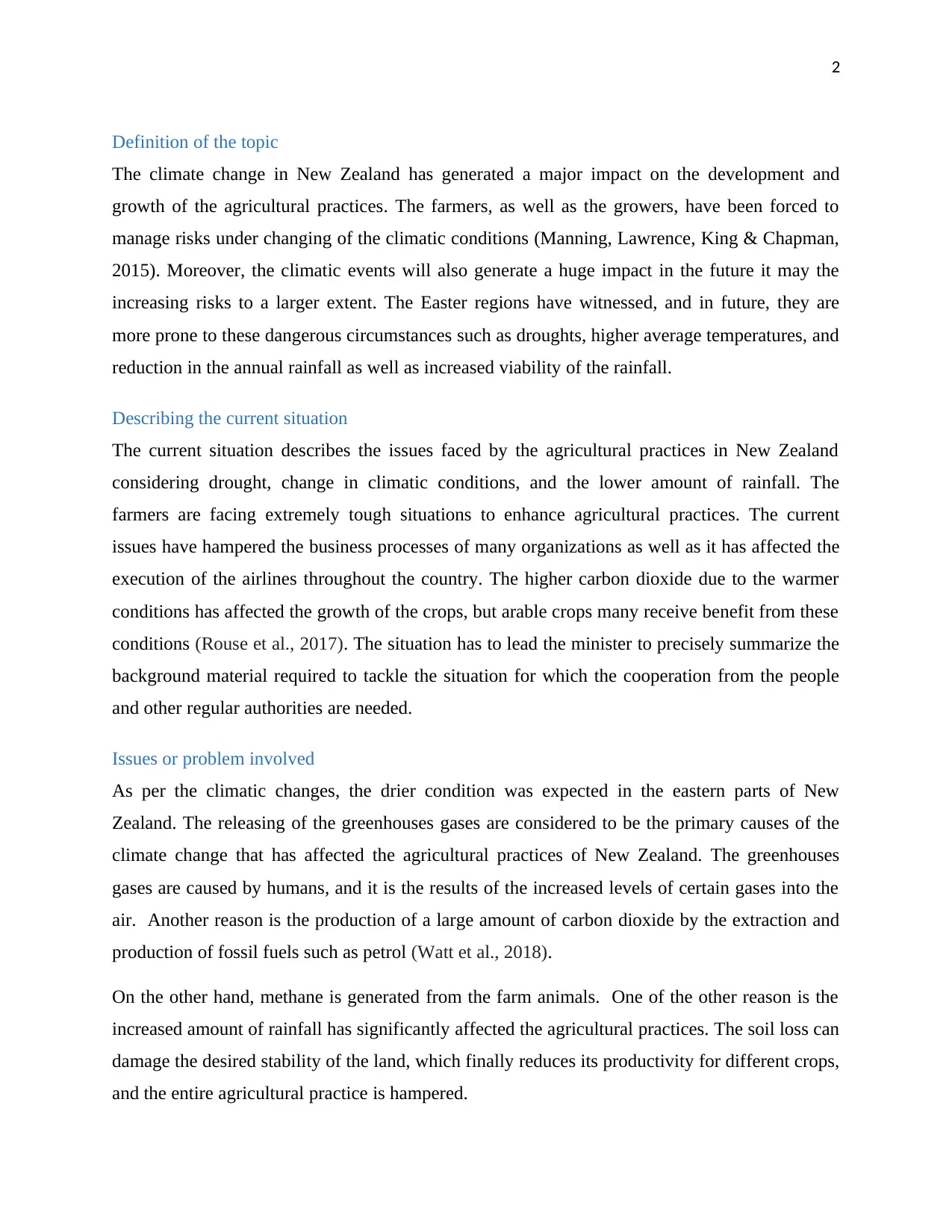
2
Definition of the topic
The climate change in New Zealand has generated a major impact on the development and
growth of the agricultural practices. The farmers, as well as the growers, have been forced to
manage risks under changing of the climatic conditions (Manning, Lawrence, King & Chapman,
2015). Moreover, the climatic events will also generate a huge impact in the future it may the
increasing risks to a larger extent. The Easter regions have witnessed, and in future, they are
more prone to these dangerous circumstances such as droughts, higher average temperatures, and
reduction in the annual rainfall as well as increased viability of the rainfall.
Describing the current situation
The current situation describes the issues faced by the agricultural practices in New Zealand
considering drought, change in climatic conditions, and the lower amount of rainfall. The
farmers are facing extremely tough situations to enhance agricultural practices. The current
issues have hampered the business processes of many organizations as well as it has affected the
execution of the airlines throughout the country. The higher carbon dioxide due to the warmer
conditions has affected the growth of the crops, but arable crops many receive benefit from these
conditions (Rouse et al., 2017). The situation has to lead the minister to precisely summarize the
background material required to tackle the situation for which the cooperation from the people
and other regular authorities are needed.
Issues or problem involved
As per the climatic changes, the drier condition was expected in the eastern parts of New
Zealand. The releasing of the greenhouses gases are considered to be the primary causes of the
climate change that has affected the agricultural practices of New Zealand. The greenhouses
gases are caused by humans, and it is the results of the increased levels of certain gases into the
air. Another reason is the production of a large amount of carbon dioxide by the extraction and
production of fossil fuels such as petrol (Watt et al., 2018).
On the other hand, methane is generated from the farm animals. One of the other reason is the
increased amount of rainfall has significantly affected the agricultural practices. The soil loss can
damage the desired stability of the land, which finally reduces its productivity for different crops,
and the entire agricultural practice is hampered.
Definition of the topic
The climate change in New Zealand has generated a major impact on the development and
growth of the agricultural practices. The farmers, as well as the growers, have been forced to
manage risks under changing of the climatic conditions (Manning, Lawrence, King & Chapman,
2015). Moreover, the climatic events will also generate a huge impact in the future it may the
increasing risks to a larger extent. The Easter regions have witnessed, and in future, they are
more prone to these dangerous circumstances such as droughts, higher average temperatures, and
reduction in the annual rainfall as well as increased viability of the rainfall.
Describing the current situation
The current situation describes the issues faced by the agricultural practices in New Zealand
considering drought, change in climatic conditions, and the lower amount of rainfall. The
farmers are facing extremely tough situations to enhance agricultural practices. The current
issues have hampered the business processes of many organizations as well as it has affected the
execution of the airlines throughout the country. The higher carbon dioxide due to the warmer
conditions has affected the growth of the crops, but arable crops many receive benefit from these
conditions (Rouse et al., 2017). The situation has to lead the minister to precisely summarize the
background material required to tackle the situation for which the cooperation from the people
and other regular authorities are needed.
Issues or problem involved
As per the climatic changes, the drier condition was expected in the eastern parts of New
Zealand. The releasing of the greenhouses gases are considered to be the primary causes of the
climate change that has affected the agricultural practices of New Zealand. The greenhouses
gases are caused by humans, and it is the results of the increased levels of certain gases into the
air. Another reason is the production of a large amount of carbon dioxide by the extraction and
production of fossil fuels such as petrol (Watt et al., 2018).
On the other hand, methane is generated from the farm animals. One of the other reason is the
increased amount of rainfall has significantly affected the agricultural practices. The soil loss can
damage the desired stability of the land, which finally reduces its productivity for different crops,
and the entire agricultural practice is hampered.
⊘ This is a preview!⊘
Do you want full access?
Subscribe today to unlock all pages.

Trusted by 1+ million students worldwide
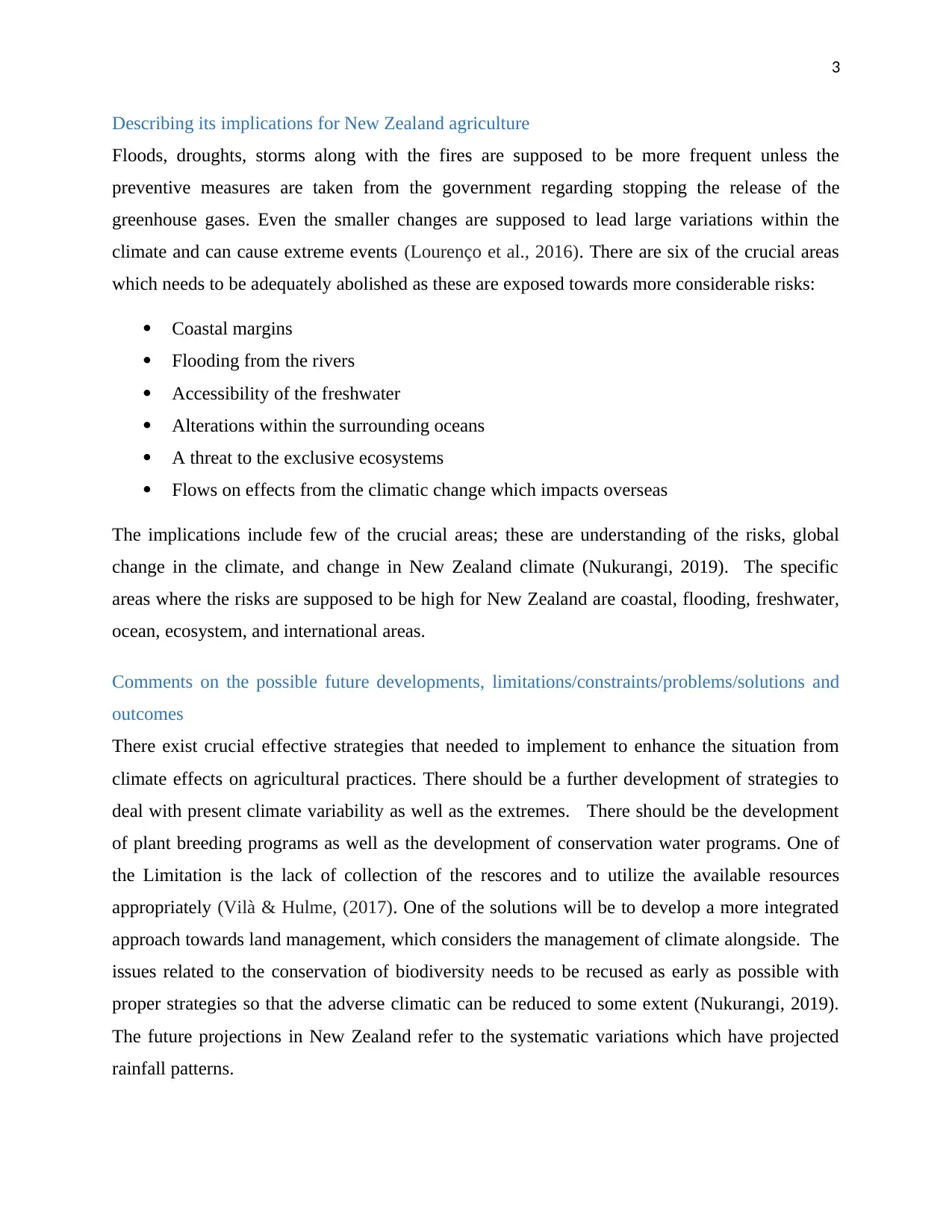
3
Describing its implications for New Zealand agriculture
Floods, droughts, storms along with the fires are supposed to be more frequent unless the
preventive measures are taken from the government regarding stopping the release of the
greenhouse gases. Even the smaller changes are supposed to lead large variations within the
climate and can cause extreme events (Lourenço et al., 2016). There are six of the crucial areas
which needs to be adequately abolished as these are exposed towards more considerable risks:
Coastal margins
Flooding from the rivers
Accessibility of the freshwater
Alterations within the surrounding oceans
A threat to the exclusive ecosystems
Flows on effects from the climatic change which impacts overseas
The implications include few of the crucial areas; these are understanding of the risks, global
change in the climate, and change in New Zealand climate (Nukurangi, 2019). The specific
areas where the risks are supposed to be high for New Zealand are coastal, flooding, freshwater,
ocean, ecosystem, and international areas.
Comments on the possible future developments, limitations/constraints/problems/solutions and
outcomes
There exist crucial effective strategies that needed to implement to enhance the situation from
climate effects on agricultural practices. There should be a further development of strategies to
deal with present climate variability as well as the extremes. There should be the development
of plant breeding programs as well as the development of conservation water programs. One of
the Limitation is the lack of collection of the rescores and to utilize the available resources
appropriately (Vilà & Hulme, (2017). One of the solutions will be to develop a more integrated
approach towards land management, which considers the management of climate alongside. The
issues related to the conservation of biodiversity needs to be recused as early as possible with
proper strategies so that the adverse climatic can be reduced to some extent (Nukurangi, 2019).
The future projections in New Zealand refer to the systematic variations which have projected
rainfall patterns.
Describing its implications for New Zealand agriculture
Floods, droughts, storms along with the fires are supposed to be more frequent unless the
preventive measures are taken from the government regarding stopping the release of the
greenhouse gases. Even the smaller changes are supposed to lead large variations within the
climate and can cause extreme events (Lourenço et al., 2016). There are six of the crucial areas
which needs to be adequately abolished as these are exposed towards more considerable risks:
Coastal margins
Flooding from the rivers
Accessibility of the freshwater
Alterations within the surrounding oceans
A threat to the exclusive ecosystems
Flows on effects from the climatic change which impacts overseas
The implications include few of the crucial areas; these are understanding of the risks, global
change in the climate, and change in New Zealand climate (Nukurangi, 2019). The specific
areas where the risks are supposed to be high for New Zealand are coastal, flooding, freshwater,
ocean, ecosystem, and international areas.
Comments on the possible future developments, limitations/constraints/problems/solutions and
outcomes
There exist crucial effective strategies that needed to implement to enhance the situation from
climate effects on agricultural practices. There should be a further development of strategies to
deal with present climate variability as well as the extremes. There should be the development
of plant breeding programs as well as the development of conservation water programs. One of
the Limitation is the lack of collection of the rescores and to utilize the available resources
appropriately (Vilà & Hulme, (2017). One of the solutions will be to develop a more integrated
approach towards land management, which considers the management of climate alongside. The
issues related to the conservation of biodiversity needs to be recused as early as possible with
proper strategies so that the adverse climatic can be reduced to some extent (Nukurangi, 2019).
The future projections in New Zealand refer to the systematic variations which have projected
rainfall patterns.
Paraphrase This Document
Need a fresh take? Get an instant paraphrase of this document with our AI Paraphraser
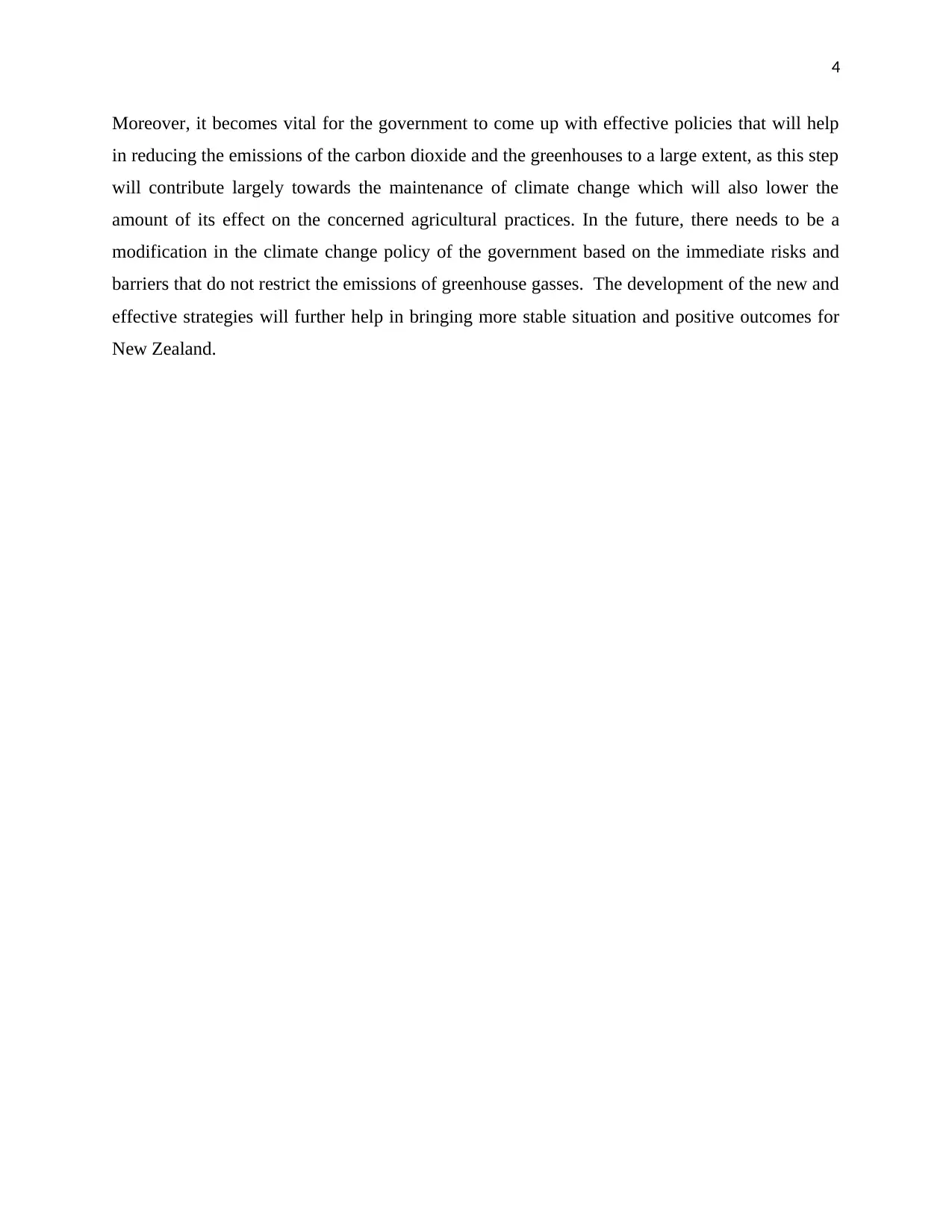
4
Moreover, it becomes vital for the government to come up with effective policies that will help
in reducing the emissions of the carbon dioxide and the greenhouses to a large extent, as this step
will contribute largely towards the maintenance of climate change which will also lower the
amount of its effect on the concerned agricultural practices. In the future, there needs to be a
modification in the climate change policy of the government based on the immediate risks and
barriers that do not restrict the emissions of greenhouse gasses. The development of the new and
effective strategies will further help in bringing more stable situation and positive outcomes for
New Zealand.
Moreover, it becomes vital for the government to come up with effective policies that will help
in reducing the emissions of the carbon dioxide and the greenhouses to a large extent, as this step
will contribute largely towards the maintenance of climate change which will also lower the
amount of its effect on the concerned agricultural practices. In the future, there needs to be a
modification in the climate change policy of the government based on the immediate risks and
barriers that do not restrict the emissions of greenhouse gasses. The development of the new and
effective strategies will further help in bringing more stable situation and positive outcomes for
New Zealand.
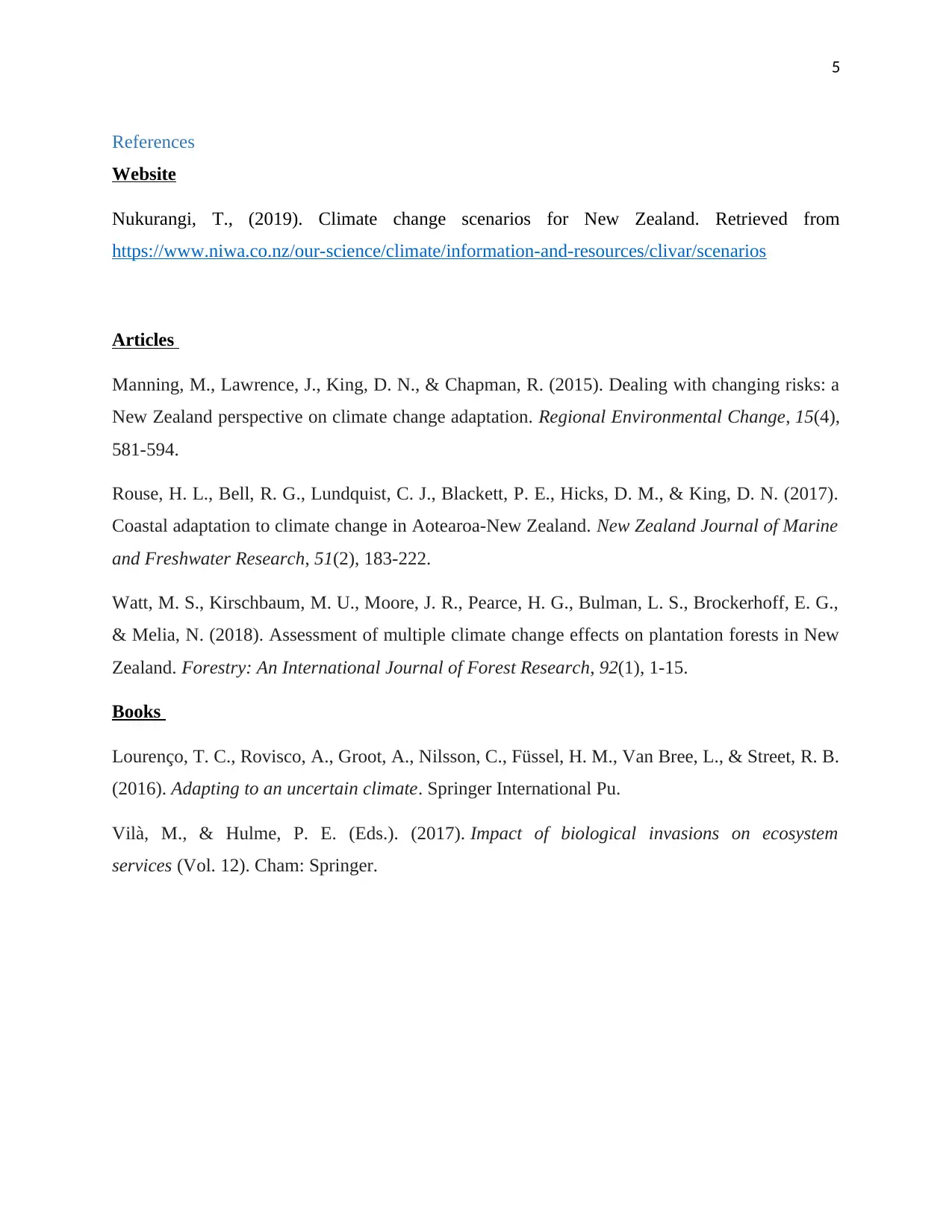
5
References
Website
Nukurangi, T., (2019). Climate change scenarios for New Zealand. Retrieved from
https://www.niwa.co.nz/our-science/climate/information-and-resources/clivar/scenarios
Articles
Manning, M., Lawrence, J., King, D. N., & Chapman, R. (2015). Dealing with changing risks: a
New Zealand perspective on climate change adaptation. Regional Environmental Change, 15(4),
581-594.
Rouse, H. L., Bell, R. G., Lundquist, C. J., Blackett, P. E., Hicks, D. M., & King, D. N. (2017).
Coastal adaptation to climate change in Aotearoa-New Zealand. New Zealand Journal of Marine
and Freshwater Research, 51(2), 183-222.
Watt, M. S., Kirschbaum, M. U., Moore, J. R., Pearce, H. G., Bulman, L. S., Brockerhoff, E. G.,
& Melia, N. (2018). Assessment of multiple climate change effects on plantation forests in New
Zealand. Forestry: An International Journal of Forest Research, 92(1), 1-15.
Books
Lourenço, T. C., Rovisco, A., Groot, A., Nilsson, C., Füssel, H. M., Van Bree, L., & Street, R. B.
(2016). Adapting to an uncertain climate. Springer International Pu.
Vilà, M., & Hulme, P. E. (Eds.). (2017). Impact of biological invasions on ecosystem
services (Vol. 12). Cham: Springer.
References
Website
Nukurangi, T., (2019). Climate change scenarios for New Zealand. Retrieved from
https://www.niwa.co.nz/our-science/climate/information-and-resources/clivar/scenarios
Articles
Manning, M., Lawrence, J., King, D. N., & Chapman, R. (2015). Dealing with changing risks: a
New Zealand perspective on climate change adaptation. Regional Environmental Change, 15(4),
581-594.
Rouse, H. L., Bell, R. G., Lundquist, C. J., Blackett, P. E., Hicks, D. M., & King, D. N. (2017).
Coastal adaptation to climate change in Aotearoa-New Zealand. New Zealand Journal of Marine
and Freshwater Research, 51(2), 183-222.
Watt, M. S., Kirschbaum, M. U., Moore, J. R., Pearce, H. G., Bulman, L. S., Brockerhoff, E. G.,
& Melia, N. (2018). Assessment of multiple climate change effects on plantation forests in New
Zealand. Forestry: An International Journal of Forest Research, 92(1), 1-15.
Books
Lourenço, T. C., Rovisco, A., Groot, A., Nilsson, C., Füssel, H. M., Van Bree, L., & Street, R. B.
(2016). Adapting to an uncertain climate. Springer International Pu.
Vilà, M., & Hulme, P. E. (Eds.). (2017). Impact of biological invasions on ecosystem
services (Vol. 12). Cham: Springer.
⊘ This is a preview!⊘
Do you want full access?
Subscribe today to unlock all pages.

Trusted by 1+ million students worldwide
1 out of 6
Related Documents
Your All-in-One AI-Powered Toolkit for Academic Success.
+13062052269
info@desklib.com
Available 24*7 on WhatsApp / Email
![[object Object]](/_next/static/media/star-bottom.7253800d.svg)
Unlock your academic potential
Copyright © 2020–2026 A2Z Services. All Rights Reserved. Developed and managed by ZUCOL.




